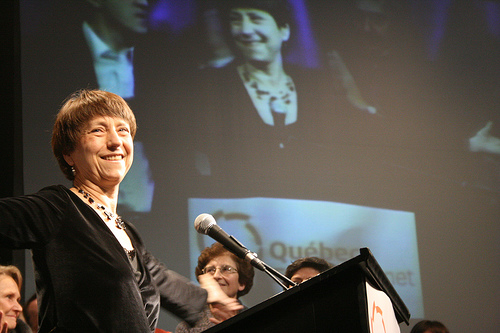This election, all parties with sitting MNAs have a bus on which journalists can follow around the campaign. Last week, it was reported by Le Devoir that their journalist was the only one on the Québec Solidaire bus. With PKP’s candidacy putting a focus on media bias, many people online questioned the mainstream media’s bias against the progressive party.
The bus has been controversial within the party. While party activists wanted to give journalists the same chance to follow their campaign as the other parties offered, many of us knew that it probably wouldn’t work out that way. As QS competes for air time with the Liberals, the Parti Québécois and the Coalition Avenir de Québec, and as it has emerged as the only alternative to politics as usual, the deficiencies in covering the QS campaign suppresses the chances for many Québecers to consider voting for QS.
It’s really a shame. Most media outlets have the resources to dedicate to following around the fourth party. But even if that weren’t the case, there are other ways to ensure coverage for our mighty party. In my local paper, Le Soleil (owned by a subsidiary of Power Corp), they have a daily, 50-word brief on where each party will be for the day. QS is missing.
Promoting the status quo through omission is common within the mainstream press. With a media landscape where 40 per cent of all media are owned by the PQ candidate for St. Jerome, it’s naïve to imagine that QS will win broad exposure thanks to solid reporting.
But, despite a lack of coverage, QS’s popular vote is slowly climbing in the polls.
Among QS activists, there’s a strong sense that this election is different than any previous election. The PQ’s reliance on anti-union candidates (not just PKP but also Simon Prévost, President of Manufacturiers et Exportateurs du Québec and former VP for the Canadian Federation of Independent Business, for example), has made it clear that they want to court voters from the right-wing CAQ and Liberals. This has left a huge opening for QS.
The lacklustre promises of the other parties have helped, too. Aside from chatter about star candidates, the three major parties have had little to offer Québécers, especially anything that’s new.
The Liberals have tried to position themselves as the serious business party (even their slogan is “We take care of real business”). Leader Phillip Couillard wants to resurrect their Plan Nord, the plan that seeks to extract more than ever before from Québec’s north.
The PQ has also tried to paint itself as an economically responsible party. As such, they’ve used the Charter of Values and the possibility of a referendum to help avoid questions about their economic record and plans. With PKP as their star candidate, the PQ hoped that their business competence would be indisputable.
The third-place party, the CAQ, has mostly talked about tax cuts and shrinking the size of the public service. With their leader, François Legault painting himself as a business man, the CAQ has tried to make itself look like the only party capable of managing Québec’s economy with populist, anti-tax rhetoric and not much else.
Despite the hollowness of the promises coming from the Liberals, PQ and the CAQ, these parties dominate the news coverage. Even as the support for the CAQ hovers around the low teens, the mainstream press reports on them as if they’re as viable option as the PQ or PLQ.
Yesterday, QS launched their economic plan. The plan promises to make 160,000 jobs, mostly in construction, to build new public transportation systems and new forms of energy generation. Some journalists were confused by the fact that their economic plan was geared to limiting Québec’s reliance on oil. In a world where a good economic policy normally relies on the destruction of the earth, a plan that seeks to build an economy that does exactly the opposite can be confusing.
According to a CROP poll released this morning, voter intentions have shifted. The Liberals have taken the lead, QS has increased and the other two parties have dropped.
It’s impossible to tell whether or not the bump in support for QS to 10 per cent of vote intentions is the result of the economic plan, a reflection of media coverage or a change in the sample of voters. For a party that places its policies on the democratic will of the membership, the polls don’t matter as much as they do for a party driven by them.
Regardless, it’s an important reminder of the power that journalists have during an election, and how critical it is that coverage is fair, even and balanced.
It’s only Day 14 and maybe things will change. I don’t expect QS to be given the same amount of air time or column inches as the PQ and, as of yesterday, it seems that mainstream media outlets are paying more attention to QS this week than during the previous two.
But, for a party of the ballot box and of the streets, QS activists can hardly complain that it’ll be in the streets where we convince Québécers of our ideas and achieve our victories.
Nora will be reporting on the Québec election until long after all the votes are counted. Read her previous updates: Update 2: The PQ lurches right with Pierre Karl Péladeau and Update 1: The Charter. Any questions? Email [email protected]
Image: flickr/lariposte



